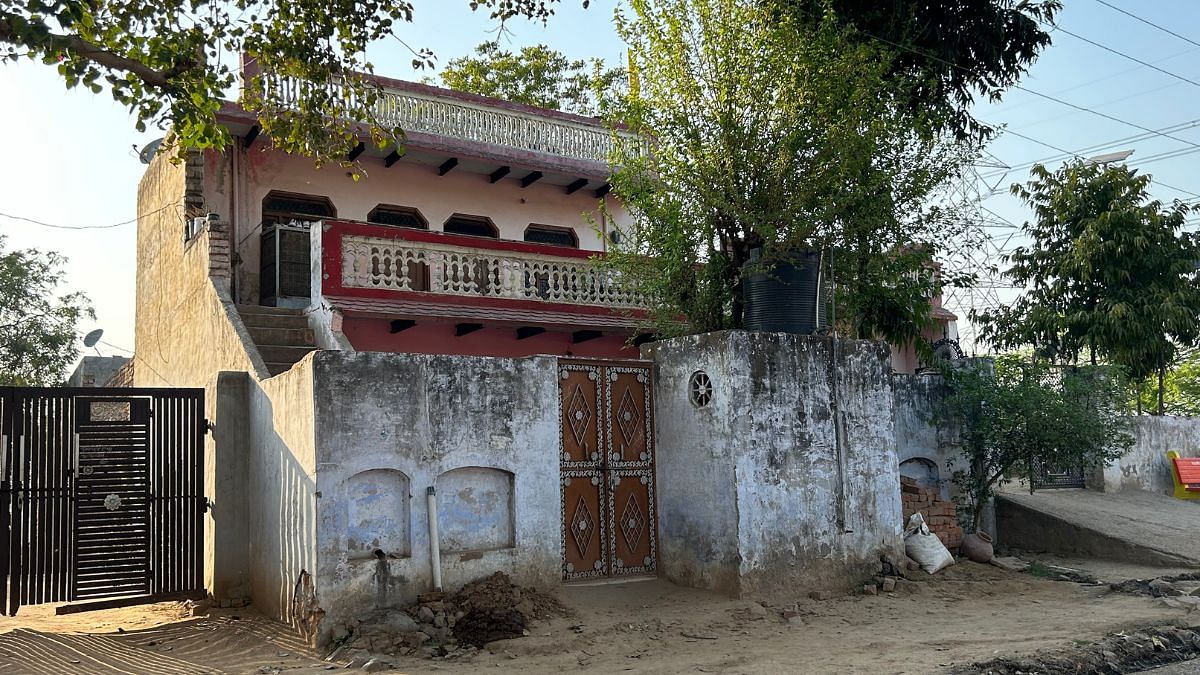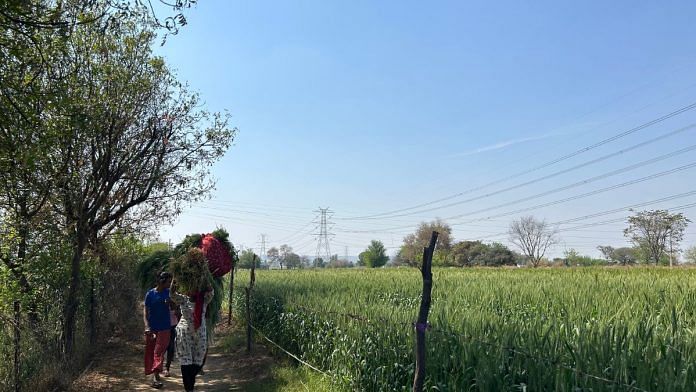Sohna: Rahul Kumar and Mansi Khatana fell in love, tried to elope, were separated by their families, and brought back to their homes. The second of February was the last they saw each other. On Saturday, the Haryana police recovered the ashes and skeletal remains of a woman in the Aravali forest in Gurugram’s Sohna, days after arresting Mansi’s father, uncle, and cousin for murder. The young Gujjar woman, who was studying computers after recently finishing Class 12, was killed allegedly by the men in her family for falling in love with the wrong man—a Dalit. The tragedy unfolded in Kherla village, barely 20 km away from glitzy, urban Gurugram.
Rahul, 21, and Mansi, 18, defied the ‘rules’ for love—a crime punishable by death in Haryana. Neither family approved of the union. The couple had to be punished, but Rahul did not expect it to end in a murder.
Between 2017 and 2021, Haryana has recorded 14 killings in the name of ‘honour’, Minister of State for Home Affairs Nityanand Rai informed the Rajya Sabha in April 2023. But social activists lobbying for a separate law say the data does not represent the actual number. Last September, just a month before Rahul met Mansi for the first time, the parents of a 21-year-old woman from Balu village in Kaithal district had been arrested for killing their daughter and covering up the crime as a suicide.
Mansi’s father, Balbir (48), too tried to cover her death by filing a missing person’s complaint. It took the police more than a month to gather evidence and arrest him, his brother Ashok and nephew Bhura under Sections 302 (murder) and 346 (wrongful confinement) of the Indian Penal Code. The three are currently under police custody until 12 March.
At his one-storey house in Raisina village, Rahul grips a cup of tea sitting on the edge of a narrow staircase, tears pouring down his face. His mother is preparing food in their make-shift mud-floor kitchen, but Rahul hasn’t eaten for days. Furiously wiping his tears away, he recalls how he met Mansi, but can only say two words: “Bus stand” and “October”.
Now, the Kumars are worried their son will be killed as well.
“They choked her inside the house, took her dead body to the jungle behind the mountain, and burnt her there,” alleges Rahul’s father, Ram Kishan Kumar.
“They killed their own daughter, why would they spare our son?”
The police are yet to release any details, waiting for the forensic report to confirm if the remains found belong to Mansi.
“They killed their own daughter, why would they spare our son?” asks Ram Kishan, who works as a bus driver.

Also read: In Tamil Nadu’s Tiruppur, Bihari migrants are the new business bosses. Who do they employ?
Young love
For five months, Mansi and Rahul would meet secretly in Sohna. He was pursuing a skill development course at an Industrial Training Institute and she travelled to attend her computer classes. Knowing their families would not approve of their inter-caste relationship, one day they decided to elope and get married in court.
On 31 January, when Mansi did not return home from her computer classes in Sohna, her family reportedly turned up at the Kumars and threatened them.
“They said they would kidnap us all if we didn’t return their daughter,” Beena, Rahul’s mother, told ThePrint.
Absconding for two days, the couple landed in a court in Sohna on 2 February, from where Rahul rang his elder sister asking her to bring some money for the paperwork.
We told him people from their caste would never let him be with Mansi, says Beena.
She immediately informed the family members, who knew this marriage would not bode well for them or their community. The Kumars rushed to the court and brought the couple back. They went to the house of the sarpanch of Kherla village. There, Rahul was kept separately in a room and after some discussion with the sarpanch, Mansi was handed over to her family with the assurance from the Kumars that Rahul would never meet her again.
For the Kumar family, the matter amicably ended there.
“He did not meet or even hear her voice since that day. We told him people from their caste would never let him be with Mansi,” said Beena.
What they didn’t know was that Balbir, after the meeting with the sarpanch on 2 February, went to the Sadar Sohna police station that same evening and filed a missing person’s report. He claimed that she had been kidnapped.
“We searched everywhere but could not find her. I suspect that my daughter has left with a resident of Raisina village,” he said in his complaint. At the time, the police registered an FIR for wrongful confinement but knew from experience that there was likely more to this story.
Murder investigation
A few days after Balbir’s complaint, an informant reached out to the police—Mansi had been killed by her own family.
“The investigation is still ongoing, today the investigating officer has taken the accused to Gadganga in Hapur, Uttar Pradesh,” said an officer who did not want to be named.
The investigation team started probing the case as a murder, instead of kidnapping. But getting evidence to make an arrest was the challenge.
Often, neighbours and other villagers are complicit in hiding details in cases of ‘honour killing’. In Balu village, for instance, the 21-yea-old woman’s death was passed off as an accident and then a suicide. The body was cremated the day she died.
While investigating Mansi’s ‘disappearance’, the police made several visits to Raisina village. They eventually raided her house early this month and arrested the father, uncle, and her cousin, who allegedly confessed to killing Mansi.
A report jointly prepared by the Dalit Human Rights Defenders Network and National Council of Women Leaders shows an apparent rise in the reported cases of so-called “honour killings’. The report highlighted 24 cases between 2012 and 2021, revealing that in most cases the victims and survivors faced violence from members of the family—primarily the upper-caste groups—who opposed the relationship.

‘Tip of the iceberg’
The Kumars are shaken by the events over the last few days. Beena despairs over her son.
“He has gone mad since that day,” says Beena. “They used to talk every day, but now suddenly she is dead and he is in sorrow.”
In states like Haryana, where gender discrimination is rampant, catchy campaigns like ‘Beti Bachao, Beti Padhao’ make little difference when women dare to breach the strict boundaries. Education and reservation for women in panchayat bodies have had little impact.
Jagmati Sangwan, general secretary of All India Democratic Women’s Association, told ThePrint that the Punjab and Haryana High Court is flooded with petitions from inter-caste couples seeking protection. “We need a proper redressal cell,” she said, adding that the number of cases highlighted in the media are just the “tip of the iceberg.”
There have been cases where entire families were killed, says Jagmati Sangwan
Sangwan said that during the UPA-II government, protection homes were built in Punjab and Haryana for couples escaping violence from family and community members, and activists pressured the government for legal protection against such violence.
“A Group of Ministers (GoM) was created, but it never met. The violence has [only] increased. There have been cases where entire families were killed,” Sangwan said.
When a dominant-caste woman marries a man from the oppressed community, it causes a power shift since the woman’s family often has to give the man belonging to a poor caste and class a piece of land to sustain the family, said Sangwan. But, “when a lower-caste woman marries a man from a high caste, then the chances of violence is less,” she said, noting how men from the dominant caste “even buy women from other states because the sex ratio is so bad in Haryana”.
Also read: Domestic workers are turning hostile in court after alleging torture in Delhi NCR homes
Villagers blame the woman
In less than half an hour, the wide concretised roads, gleaming glass towers, posh residential complexes, malls and restaurants of Gurugram give way to open fields, forests, and bumpy roads. Instead of pavements lined with cafes and restaurants, the sight changes to herds of buffaloes, goats and even the occasional camel being herded into the fields.
About 20 km away is Mansi’s home in Kherla. Her house is locked—but it looks like everyone left in a hurry. Washed clothes are still hanging on the railings gathering dust. Bedding on charpais is unmade as if the people sleeping on them got up and left without looking back.

“The father, uncle and a cousin were dragged out of their home and taken away in a police vehicle. The mother and younger sister have fled,” said a villager who did not want to be named.
Villagers are reluctant to talk about what happened to Mansi once the Kumars left after the sarpanch meeting. The older people are sympathetic toward the parents, worried about what will happen to them now.
A few old women, in their 80s, gathered at the village square to talk about the ‘shame’ brought on them.
“Jo ladkiyan aise kareengi, unko aise hi maarna chahiye (women who do such things should be murdered like this),” said the oldest of the three women.
Some blame education, cellphones, and social media for leading women ‘astray’.
“These things happen when girls are given more education than needed. Now, our whole village has become infamous and nobody will marry our daughters or sons because people will think we kill our women,” said a shopkeeper, refusing to mention his name.
If Mansi hadn’t been sent to Sohna for the computer classes home, she would have never met Rahul and would still be alive, another villager said.
“They did good. Being a Gujjar, she fell in love with a Chamar,” says a teenage boy before he turned around to watch the construction of the village’s new cell tower.
(Edited by Prashant)



